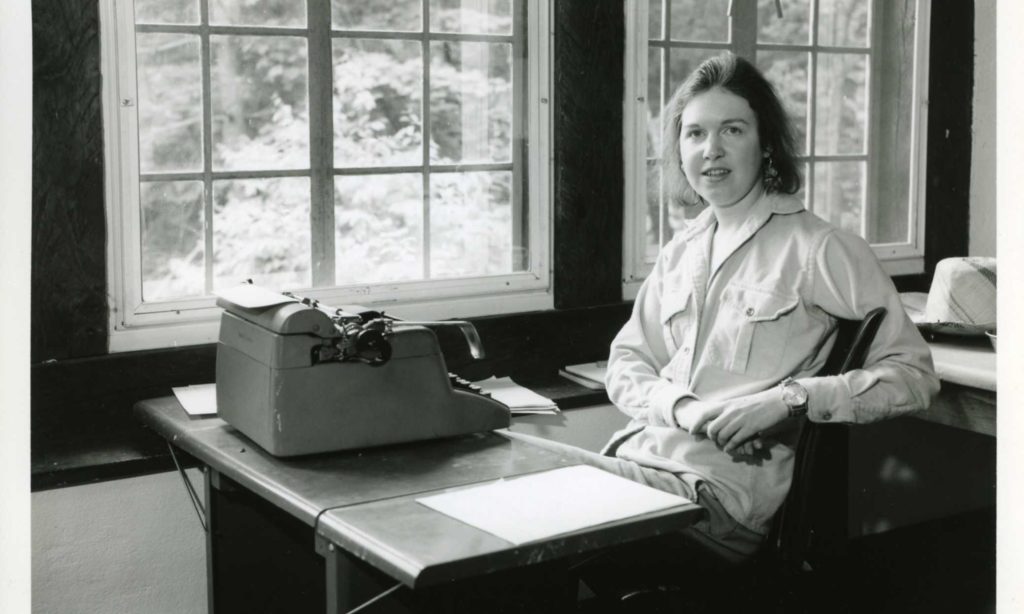Much of the work written during Julie Hayden’s four residencies at The MacDowell Colony in the 1970s.
MacDowell Fellow Julie Hayden’s compelling story collection The Lists of the Past, much of it completed during four residencies at The MacDowell Colony, has been re-issued by Pharos Editions. Described by the publisher as “an iconic story collection of heartbreakingly vulnerable characters caught against the backdrop of nostalgic New York,” the book was originally published by The Viking Press in 1976. Ten of the stories first appeared in The New Yorker, where Hayden worked for 16 years before her tragic death at age 42 of kidney failure.
The daughter of Pulitzer-prize-winning poet Phyllis McGinley and Bill Hayden, a public relations analyst at Bell Telephone, Hayden started writing at a young age. According to her sister, Patsy Blake, even her earliest childhood poems showed extraordinary insight into human suffering.
“She was an emotionally raw person,” says Blake, “but also very funny – emotionally tangled, and complicated. She had unique observations and ways of expressing herself.”
The path to the book’s re-publication in May depended upon everything aligning just right – a highly regarded author (Lorrie Moore) recording a podcast of one of the collection’s stories (“Day-Old Baby Rats”) with The New Yorker; the writer S. Kirk Walsh listening to Moore‘s podcast while on a road trip with her husband and then contributing an essay about Hayden and her work to The Los Angeles Review of Books; and finally, bestselling author Cheryl Strayed being recommended “Day-Old Baby Rats” by poet and MacDowell Fellow Cate Marvin and then reading Walsh’s piece. Strayed’s discovery happened soon after being asked by Pharos Editions to introduce an out-of-print book and right away Hayden’s collection emerged as the likely candidate. And the rest is history.
In the introduction to the new edition, Strayed writes, “Hayden’s stories are unlike anything I’ve ever read. Her writing is original and bold, plainspoken and poetic. There’s a cavernous loneliness at the core of her work, one that echoes the difficulty of her short life, no doubt — but also a vast beauty, one that I believe must also reflect her inner world.”
It’s this fragility, raw emotion, and keen observation that powers the voice in the story many feel is the strongest in the collection, “Day-Old Baby Rats.” Blake says this story is her favorite, as it pulls no punches, revealing the stark and poignant reality of what it was like to be female in the 70s when women’s roles were changing.
“I think (the story) represents the lost career girl in New York – not yet a woman of today and yet modern and pushing against the older restrictions,” says Blake. “Some of these women got lost, and Julie was one of them.”
Walsh, who wrote the piece for the Los Angeles Review of Books that influenced the book’s republication, believes it’s this strong female voice that helped rescue Hayden from obscurity. That, and the fact that she never shied away from difficult subjects, gives her writing, especially the story “Day-Old Baby Rats,” a timeless appeal, she says.
“What struck me first,” says Walsh, “was her ability to express acute suffering. Writing about abortion is very hard, and then alcoholism – she captured it so vividly and so well. It sort of took my breath away. I identified with the loneliness – that you can be on a crowded sidewalk walking up Fifth Avenue and be the only person in the world.”
Walsh believes there is an ongoing conversation in women’s literature, and for her, Hayden’s stories give perspective to that conversation.
“All artists are trying to unpack the darker parts of themselves. She didn’t shy away from her phobias, addictions, and losses. That kind of immediacy is inspiring.”
MacDowell Colony Executive Director Cheryl A. Young learned about the new edition and the MacDowell connection from an artist in residence who had heard about Hayden from a fellow writer and was thrilled to have found the original edition on the Savidge Library shelves.
Hayden was in residence at The MacDowell Colony in 1971, 1972, 1974, and 1977, staying in Sorosis, Omicron, Baetz (now Garland), and Monday Music studios. Most if not all of The Lists of the Past was written in those studios.
“She loved MacDowell,” says Blake. “She loved the solitude and the people. She loved the romance of the MacDowell Colony – being in the forest and the deep country. It really animated her imagination and soothed her emotions.”

